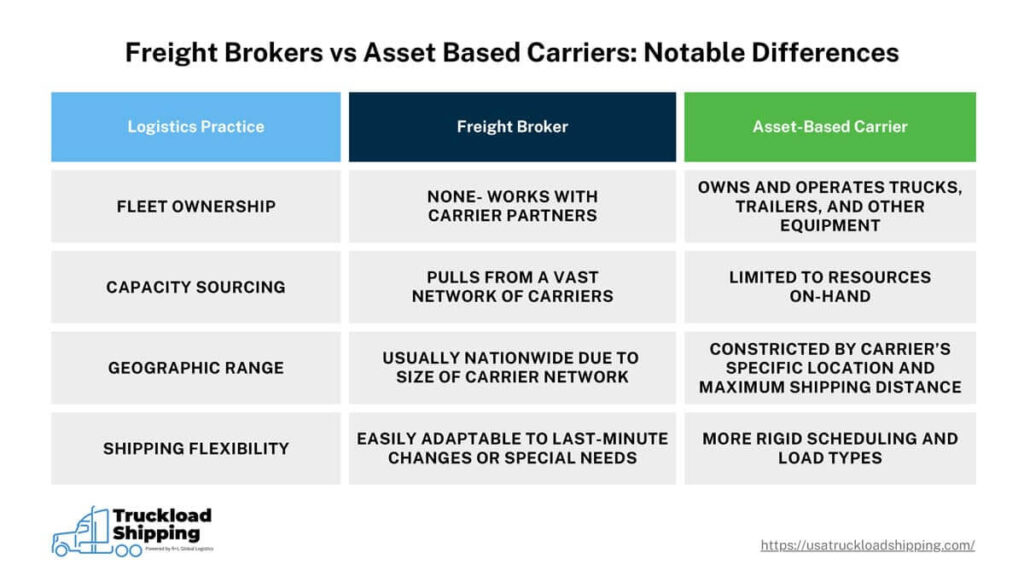When it comes to moving freight, one of the most important decisions shippers can make is choosing the right type of transportation provider. Should you go with a freight broker who offers flexible access to a vast network of diversified carriers, or an asset-based carrier that only works with equipment it owns and operates?
Key Takeaways:
Understanding the difference between these two options can save shippers time, money, and unnecessary stress.
The differences between carriers and freight brokers can be summarized as follows:
In the following table, I’ve compiled some further key differences between brokers and carriers for ease of reference.

Carrier and shippers alike benefit from this third-party assistance: shippers get access to a large network of competitive logistics service providers, and asset-based carriers can work through brokers to increase their pool of available shippers and prevent empty, or “deadhead”, miles.
Related: 5 Benefits of Using a Freight Broker for Shippers
When deciding between these two options, it's important to weigh the advantages and disadvantages of working with a freight broker.
Pros of Freight Brokers:
Cons of Freight Brokers:
While the last point may give some shippers pause, it simply means you should do your homework before choosing a brokerage. Look for brokerages who practice open communication about factors like FMCSA registration and their record for safe driving and regulatory compliance.
On the surface, it might seem that dealing directly with a carrier that owns its equipment is the safer or more reliable option. While this can be true in some scenarios, it’s not always the most practical or cost-effective solution.
If you work with the same carrier consistently, you may find it more difficult to expand operations to a national level. Brokers offer better scalability through a greater availability of resources from their carrier network.
Choosing the right partner depends on your company’s unique logistics requirements.
Consider a freight broker if you:
Meanwhile, you might benefit more from a strictly asset-based carrier if you:
Many successful shippers prefer to work with a hybrid 3PL that has its own fleet and warehouses, but can also outsource based on customer needs. They offer the steady scheduling of a strictly asset-based carrier and the versatile options a brokerage brings to the table.
Related: 3PL vs Freight Broker: Outsourcing Your Logistics Needs
While dealing directly with a carrier can be advantageous, a freight broker can offer access to carriers, warehousing providers, and different modes of transport a single carrier can’t provide. For this reason, shippers often benefit from working with brokerages and 3PLs such as ourselves.
USA Truckload Shipping has access to a nationwide network of carriers who can store, transport, and even provide final mile delivery for your business’s goods and commodities. We don’t just do FTL shipping – we also offer rail transport, warehousing, and specialized equipment like refrigerated trucks & trailers.
Our full list of services includes:
Are you ready to get your shipment on the road? Call USA Truckload Shipping at (866) 353-7178 or fill out a request for proposal online today!
R+L Global Logistics
315 NE 14th St., Ocala, FL 34470